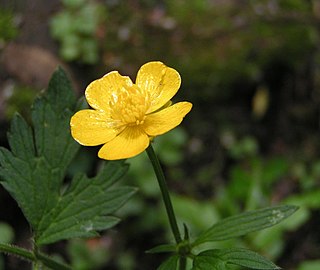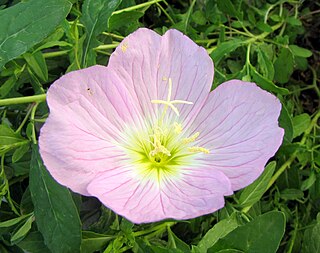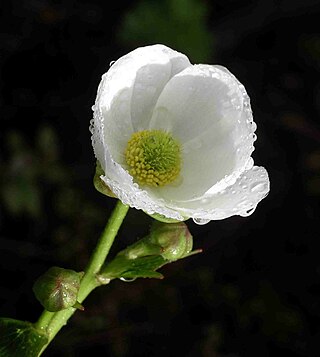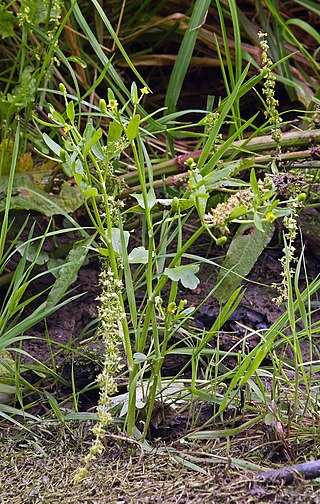
Ranunculales is an order of flowering plants. Of necessity it contains the family Ranunculaceae, the buttercup family, because the name of the order is based on the name of a genus in that family. Ranunculales belongs to a paraphyletic group known as the basal eudicots. It is the most basal clade in this group; in other words, it is sister to the remaining eudicots. Widely known members include poppies, barberries, hellebores, and buttercups.

Ranunculaceae is a family of over 2,000 known species of flowering plants in 43 genera, distributed worldwide.

Ranunculus is a large genus of about 1700 to more than 1800 species of flowering plants in the family Ranunculaceae. Members of the genus are known as buttercups, spearworts and water crowfoots.

Oxalis is a large genus of flowering plants in the wood-sorrel family Oxalidaceae, comprising over 550 species. The genus occurs throughout most of the world, except for the polar areas; species diversity is particularly rich in tropical Brazil, Mexico, and South Africa.

Oenothera speciosa is a species in the evening primrose family known by several common names, including pinkladies, pink evening primrose, showy evening primrose, Mexican primrose, and buttercups.

Ranunculus bulbosus, commonly known as bulbous buttercup or St. Anthony's turnip, is a perennial flowering plant in the buttercup family Ranunculaceae. It has bright yellow flowers, and deeply divided, three-lobed long-petioled basal leaves.
Anemone is a genus of flowering plants in the buttercup family Ranunculaceae.

Ranunculus acris is a species of flowering plant in the family Ranunculaceae, and is one of the more common buttercups across Europe and temperate Eurasia. Common names include meadow buttercup, tall buttercup, common buttercup and giant buttercup.

Ranunculus lyallii, is a species of Ranunculus (buttercup), endemic to New Zealand, where it occurs in the South Island and on Stewart Island at altitudes of 700–1,500 m. R. lyallii is the largest species in the genus Ranunculus, growing over a metre in height.

Ranunculus sceleratus known by the common names celery-leaved buttercup, celery-leaf buttercup, and cursed buttercup is a species of flowering plant in the buttercup family Ranunculaceae. It has a circumpolar distribution in the northern hemisphere, native to temperate and boreal North America and Eurasia, where it grows in wet and moist habitats, including ponds and streambanks.

Ficaria is a small genus of several species of plants in the family Ranunculaceae, which were previously grouped with Ranunculus. The genus includes Ficaria verna, known as fig buttercup or lesser celandine, and related species. The name "Ficaria" is Classical Latin for fig. Plants in the genus are closely related to true buttercups, but generally have only three sepals and swollen smooth achenes.

Thure Ludwig Theodor Kumlien was a Swedish-American ornithologist, naturalist, and taxidermist. A contemporary of Thoreau, Audubon, and Agassiz, he contributed much to the knowledge of the natural history of Wisconsin and its birds. He collected and shipped specimens to many investigators in the United States and abroad. He taught botany and zoology, as well as foreign languages, at Albion Academy, and was particularly regarded as an expert in the identification of birds’ nests.

Ranunculus flabellaris is a species of flowering plant in the buttercup genus, Ranunculus, known by the common name yellow water buttercup. It is native to much of North America, including the southern half of Canada and most of the United States.

Ranunculus aestivalis is a rare species of buttercup known by the common names fall buttercup and autumn buttercup. It is endemic to the state of Utah in the United States, where it exists only in Garfield County next to the Sevier River. It is restricted to a moist microhabitat in an otherwise dry, open ecosystem, and the amount of available habitat is very limited. This is a federally listed endangered species of the United States. It has been described as "the most graceful and showy members of the genus in the western United States," but also "one of the state's rarest and most restricted plants."
Ranunculus allenii, commonly known as Allen's buttercup, is a flowering plant in the crowfoot or buttercup family, Ranunculaceae. Generally found in wetlands in northern latitudes, it bears yellow flowers in summer, which are pollinated by insects.

Ranunculus hispidus is a species of perennial flowering plant in the buttercup family, Ranunculaceae. It is commonly known as bristly buttercup or hispid buttercup. It is a small plant native to central and eastern North America that grows to a height up to 30 cm (1 ft) and has 5-petaled yellow flowers.

Ranunculus montanus, called the mountain buttercup along with other members of its genus, is a species of flowering plant in the family Ranunculaceae, native to the mountains of central and south-central Europe, with perhaps some populations in the Republic of Karelia in Russia. Its cultivar 'Molten Gold' has gained the Royal Horticultural Society's Award of Garden Merit.















